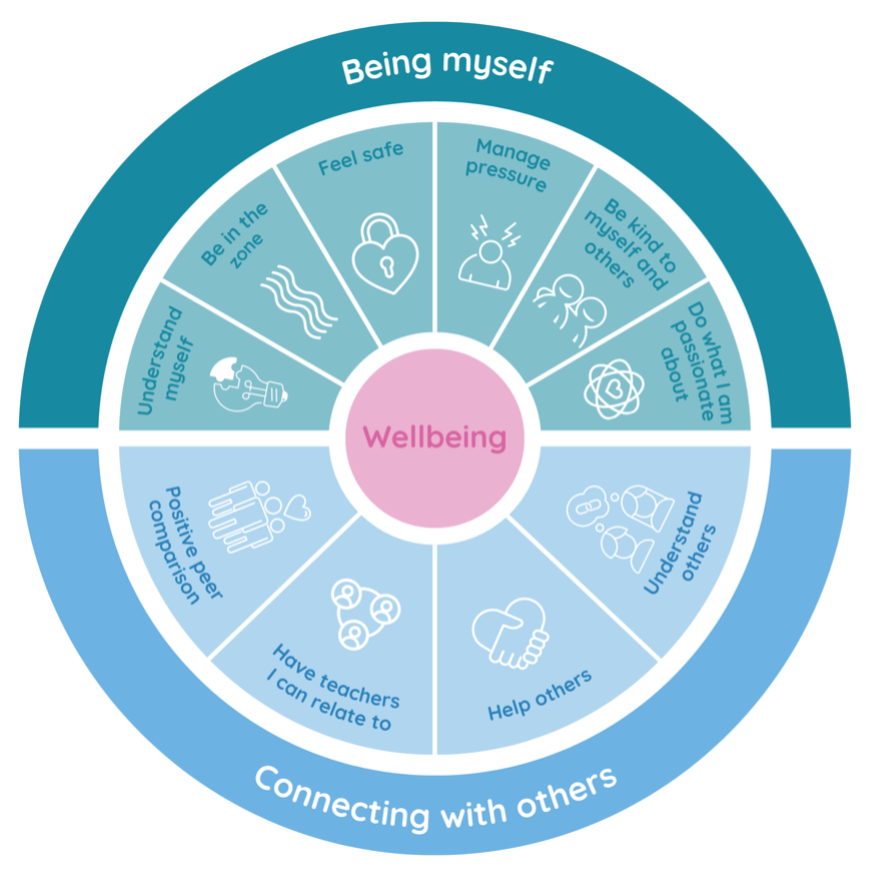In a previous project, young people who participated in arts programs (and their parents) were asked what they needed to feel good about themselves, and how the arts helped them develop social and emotional wellbeing (SEWB).
We identified two main themes from all the comments: Being Myself and Connecting with Others.

Commentaries explaining what young people needed to be themselves or connect with others were organised into sub-themes and became known as the Wellbeing Factors. A Framework was then developed around the specific Wellbeing Factors to help TAs intentionally focus on SEWB through the arts.
The chosen Wellbeing Factors are:
- Theoretically feasible to impact a young person’s SEWB (for example, can be translated onto the various levels of influence on the Social-Ecological model)
- Potentially responsive to already existing and evidence-based SEWB interventions, within an arts education context.
- Informed by, and translatable, to the themes extracted from the workshops and focus groups conducted with Western Australian (WA) arts organisations, teachers, parents, and arts students in the Building Social and Emotional Wellbeing through the Arts research project.
- Presentable in a way to empower students with the language and skills to promote their own SEWB.
With the help of a psychologist/artist, Wellbeing Factors were expanded to include explanations, evidence-based key messages, and questions to prompt: discussion with young people and parents, teacher reflection, and young people’s SEWB development.
Steps taken to build the SEW–Arts Wellbeing Factors included:
1
Discussions with young people and teaching artists (quotes)
2
Identification of themes as the basis of the framework.
3
Overlaying themes with research evidence and psychological expertise to expand on what was said.
4
Identifying the key areas by grouping themes (Turning in, Feeling, Connecting, Discovering)
Key areas
Tuning in
Tuning In is an important part of establishing wellbeing as it enables an individual to understand their internal experiences and establish a base to express emotions, develop new skills through discovery and connect with other people. The ability to understand yourself through the Tuning In process involves developing the skills of mindfulness, flow, self-awareness of emotions and thoughts and sensory awareness. These Wellbeing Factors include mindfulness, in the zone, self-awareness: thoughts, self-awareness: emotions sensory awareness.
Feeling
Feeling your emotions and expressing them is an important part of wellbeing. Talking about your feelings is just one of the many ways that feelings can be expressed. The arts provide various means of emotion expression. The Wellbeing Factors that comprise this key area are expressing emotions, self-compassion, managing pressure and coping with criticism.
Connecting
Connecting with others is vital for wellbeing and is a protective factor against anxiety and depression. There are various skills that help us connect with others effectively. These skills are represented in the Wellbeing Factors of working in groups, listening, empathising and positive peer comparison.
Discovering
Discovering what is important to you and realising your strengths is necessary to build new skills for being in the world and increasing wellbeing. This key component includes the Wellbeing Factors of doing what I value, doing something new, learning from mistakes and positive body image.



